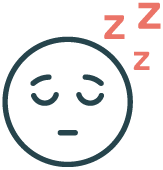QUICK LINKS ABOUT FATIGUE
Experiencing fatigue from the above examples is completely normal, but what if you experience fatigue from simple everyday things, such as cooking, driving, reading a book, listening to a lecture, screen use (computer, TV, phone, etc.)
Nutrition
For the brain and the rest of the body to function, we need three main things: oxygen, glucose and stimulation. We get oxygen from the air when we breathe. We get stimulation through everyday tasks and physical activity, but also via gravity. We get glucose from food and drink. Our energy level is the combined value of these three things, so the balance between them is incredibly important.
Balance sheet
One of the most important tasks your brain has is to determine where you are in the world and where the world is in relation to you. The brain gathers this information through a number of systems and the sum of this is what we call balance. The three main systems for balance are the inner ear, the eyes and proprioception (joint sensation). If there is miscommunication or impaired function in or between any of these systems, you will experience reduced balance. Reduced balance can lead to fatigue, because it requires more energy for the body to stay upright on two legs. In some cases, reduced balance is experienced as cognitive impairment.
Eye motor function and visual disturbances
Our eyes map our surroundings so that we can navigate our way around the world. That's why it's important that our eye motor function works optimally. It is not always easy to know that you have problems with eye motor function, unless you have nystagmus, ocular flutter and oscillopsia. Minor visual disturbances such as reduced gaze fixation ability, choppy pursuits or reduced responsiveness and accuracy with saccades (rapid jumping movements) can result in brain fog, unsteadiness, fatigue, blurred/blurred vision and dizziness.


